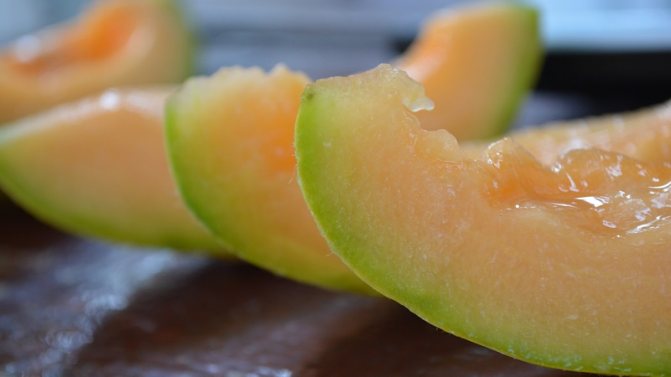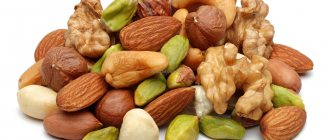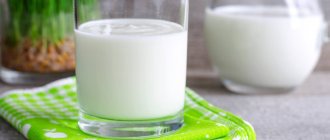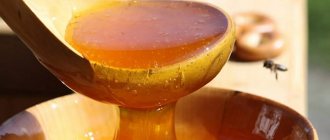The benefits of melon for the body
Melon is a nutritious, healthy fruit crop that is actively used during weight loss. It contains:
- calcium;
- folic acid;
- fiber - stabilizes stool and improves digestion processes;
- vitamin A;
- sodium;
- ascorbic acid;
- tocopherol;
- magnesium;
- nicotinic acid;
- carbohydrates - improve mood, give strength;
- iron - stimulates blood renewal;
- potassium;
- iodine.
This composition has a beneficial effect not only on the body of those losing weight, but also on any person. Eating melon during lactation energizes the nursing mother and helps strengthen hair and teeth. At the same time, the intake of a small amount of melon into the child’s body along with mother’s milk will also have a positive effect.
When should a nursing mother not eat melon?
- Allergic reactions in the baby (skin rashes, intestinal disorders).
- The mother has ulcerative defects of the stomach and duodenum, large stones in the kidneys, bladder and bile ducts, exacerbation of gastritis and pancreatitis, diabetes mellitus.
Melon should not be eaten immediately after meals, nor should it be mixed with dairy and fermented milk products, alcohol, or cold drinks.
Recommendations
To prevent the development of various negative consequences, melon should be properly introduced into the diet. Experts do not advise enjoying the juicy fruit until the baby is three months old. This means you shouldn’t take risks and eat the product so as not to harm the newborn’s body. And at 4 and 5 months you can eat this sweet crop without fear.
Why is the period set at 3 months by specialists? The fact is that during this period, intestinal function improves, and any changes in the mother’s diet can negatively affect the baby’s condition.

You can eat melon during breastfeeding only when the child is 3 months old
Some experts advise not to introduce the product into the diet until the baby is 6 months old. Such a ban is not mandatory for everyone due to the individual characteristics of the body.
Melon should be introduced into the diet gradually and only if the baby is completely healthy. To start, eat a little melon in the morning, then monitor your baby’s reaction throughout the day. If the child has no anxiety, rashes or worsening stool, eat 2 pieces of melon the next day and monitor the baby. If nothing has changed in his health or behavior, then you can eat the product without fear. It is important not to try new dishes at this stage.
If your child experiences allergic rashes, bloating, diarrhea, or restlessness, refrain from eating melon. Try reintroducing the product after 2 weeks. If negative consequences appear again, repeat the introduction of the product only after 1-2 months.
Can a nursing mother eat melon?
With the birth of a baby, a young mother’s diet changes dramatically, because through breast milk, not only all the beneficial substances are transmitted to the baby, but also harmful ones, which may not be absorbed by the child’s body. The result is diathesis and other skin rashes, which in medicine are called food allergies. But outside the window it’s the end of summer, the time when various vegetables and fruits begin to sing, and, as you know, they are the ones who are able to provide our body with all the necessary minerals and vitamins. And here the question arises: can a nursing mother eat melon?
A woman asks herself this question for a reason, especially if her child very often suffers from colic and other various disorders of the gastrointestinal tract. But in order to answer the question whether a nursing mother can eat melon, it is necessary to find out what benefits and what harm this melon crop can bring to the body.
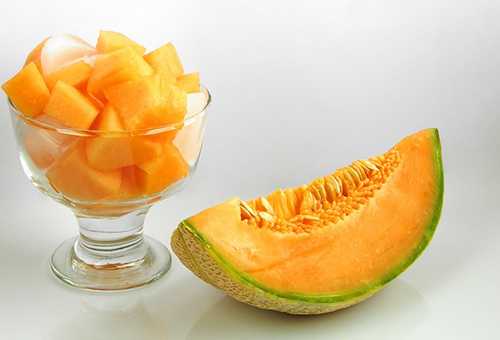
Melon is a very “controversial” product: on the one hand, it contains a lot of useful substances, and on the other, it can cause allergies and intestinal disorders
In breastfed newborns, it can cause gastrointestinal disorders and even vomiting.
How to choose the most delicious and healthy melon?
The biggest problem when purchasing is to understand whether this melon can be used by a nursing mother or whether she should choose another one. In this situation, the hands and nose should come to the aid of the eyes. They will suggest the ripest and most delicious fruit:
- A ripe melon of any kind responds with a dull sound when slapped with the palm of your hand. A ringing sound indicates the immaturity of the fetus.
- The fruit emits a pleasant, bright aroma of honey, combined with pear and vanilla, and sometimes with hints of pineapple. Other smells, with notes of green grass or garden without the usual sweetness of honey, indicate that it was picked too early.
- Damage, severe dents with a brownish tint are a sign of a fall during transportation and rotting of the fruit. It is better not to take such a product, as harmful bacteria and fungi accumulate in it.
As for choosing a place to buy, it is better to choose official markets and supermarkets. The price of fruits there is usually higher. But there is a certain guarantee of quality and safety, which is much more important during breastfeeding.
During lactation, a mother should not experiment with strange products.
Contraindications
Illiterate consumption of melon can negatively affect both the well-being of the woman and the child. Melon culture can cause the following consequences:
- Allergic reaction - there is a high probability that melon will cause diathesis in the baby.
- Increased gas formation, bloating - the product contains a large amount of fructose, which can trigger fermentation processes in the intestines.
- Diarrhea - melon has laxative properties, as a result of which the baby may experience an upset stomach.
- The risk of poisoning is no secret that when growing melons, many farmers use chemicals, which can result in poisoning. Melon must be purchased only from trusted sellers.
- Excessive consumption of the product can cause excess weight gain. This is important to take into account for those mothers who strive to return to their previous shape as quickly as possible.
- It is not recommended to eat berries for those who have stomach problems (gastritis, ulcers). It is also necessary to avoid melon if you have an intestinal disorder.
- Melons are ideal as a dessert. But, according to nutritionists, they should not be mixed with other products. Do not combine melon with bread or foods that cause fermentation in the intestines. It is forbidden to drink water after eating melon, as this can cause vomiting and diarrhea.
Based on this, the answer to the question: can a nursing mother eat melon does not have a clear answer. It all depends on the individual characteristics of the body of the baby and the mother.

Proper introduction of melon into the diet will protect you from many negative consequences.
When can I try it after giving birth?
Pediatricians do not recommend consuming melon in the first three months after birth. The reason why the product should not be consumed during this period is the imperfection of the newborn’s digestive system and the presence of sugar contained in melon, which can cause fermentation in the baby’s intestines. This product worsens the condition of colic and should be avoided until the baby stops experiencing excess gas accumulation and the gastrointestinal tract functions better.
Usually colic goes away by the end of the third month, and if the baby does not experience rashes or diarrhea during the melon season, then why not try the sweet pulp. From the age of 4 months, a nursing mother is allowed to relax in her diet, and the first complementary foods are introduced to a bottle-fed baby. It is after four months that doctors allow melon to be introduced into a nursing mother’s diet.
Important! Melon should not be included in the diet if the baby has a rash, diarrhea or vomiting. In these cases, the nursing mother is on a strict diet recommended by the doctor.
Of course, whether or not a woman can introduce this or that product into her diet when breastfeeding largely depends on the baby’s body and the maturity of his intestines. If the child does not have allergic reactions or colic in the second month of life and digestion works well, then the mother can try products recommended from the four-month period.
Rules for choosing melon
In order to maximize the benefits of using the product, you need to learn how to choose the right melon. For this:
- Buy melon no earlier than mid-August, since melons ripen only closer to autumn. Products that appeared on the market earlier than this date were grown with large amounts of chemical fertilizers. Such supplements often cause intoxication in adults, and if such melon enters the body of a newborn along with milk, the consequences can be unpredictable.
- For a nursing mother, you need to buy only ripe melon - it is easier to digest by the body, sweet and aromatic. To determine ripeness, tap the surface of the product with your knuckles. If the sound is dull, then the melon is fully ripe. The aroma of ripe melon is sweet and fresh. If the berry does not emit any odor, it is better not to buy it.
- Don't buy cut or whole cracked melon. Bacteria that have entered the product through cracks or settled on the surface can cause diarrhea and poisoning in mother and child.
- Do not buy melon with dark spots, as these may indicate the beginning of spoilage of the product.
By following these simple rules, you can be sure that you are buying a quality product that will not harm either you or your child.
Rules for using the product during lactation
In order to prevent undesirable reactions to a new product in a child, melon during breastfeeding should be introduced into milk in doses. Existing restrictions relate to the age of the newborn (at what stage does his intestines accumulate enough enzymes to cope with breast milk containing melon components). This parameter is conditional; pediatricians advise focusing more attention on the quantity and frequency of eating yellow melon.
Sweet yellow melon is a heavy product. Due to the high content of fiber and sugars, nutritionists do not recommend combining it with many dishes. An interval of at least 2 hours should be maintained between the main meal and the melon snack. For the same reason, the culture is best consumed as an independent dish. Although there are a couple of recipes, after which mother and child will not be bothered by stomach problems.
Reviews
Below are reviews from women about eating melon during lactation.
Victoria, 25 years old
I have loved melons since childhood. After giving birth, I doubted for a long time whether it was worth eating it or whether it was better to wait a year. I tried melon for the first time when the child was a month old, he had no allergies or deterioration in his health. Of course, I ate a little, 1-2 pieces at a time.
Valentina, 31 years old
When the child was 2 months old, I decided to eat some melon. In general, I don’t really like her, but that time I couldn’t restrain myself. After I ate 3 pieces of sweet berries, the child developed bloating and diarrhea. I have nothing against this product, but I still think that it is better to abstain from it during lactation.
When breastfeeding, it is advisable to eat melon only when the baby is 3 months old. In this case, the product must be introduced into the diet gradually. We hope that our article was useful to you! Subscribe to our official pages on social networks, bookmark the site to stay updated on new articles!
The benefits or harm of melon for a nursing mother and baby
Sweet melon helps quench hunger and thirst and bring a lot of gastronomic pleasure. It contains many useful microelements that will have a positive effect on the body of mother and child. Nutritionists note the following qualities of the product:
- calcium strengthens hair, nails, teeth, which is especially important for the mother, who devoted a considerable part of her “resources” to the formation of a “new person”;
- easily digestible carbohydrates, vitamins, sugars give a boost of energy, improve mood (another reason to eat a piece to get rid of postpartum depression);
- fiber activates the digestive system;
- high iodine and iron content improves blood production function and prevents the development of anemia;
- the mineral salts included in the culture have a positive effect on the urinary system, normalize the functioning of the kidneys, which have been subjected to enormous stress during pregnancy;
- the increased concentration of water helps to wash away stones and cholesterol;
- folic acid stimulates the development of the child’s brain, and calcium, potassium, magnesium, phosphorus strengthen bones and the cardiovascular system.

Plus, melon stimulates milk production.
Despite its obvious benefits, culture is an insidious product. There are a number of negative effects, due to which a debate arises whether it is possible to eat melon while breastfeeding or wait until the baby is at least 3 months old.
How can eating a treat cause harm?
- a product oversaturated with nitrates can cause poisoning;
- the increased fiber content makes it difficult to digest the pulp, which causes the baby to develop bloating, colic or diarrhea;
- in severe cases, indigestion caused by melon causes vomiting in the newborn;
- A large amount of sugars leads to allergies.
- Plus, melon is a high-calorie product. Women who have gained excess weight during pregnancy should avoid it.
The negative impact of melon is often caused not so much by the product itself, but by its combination with dairy, fish, and meat dishes. If possible, you should try to eat it in isolation from other foods, especially avoid combining melon with honey.
